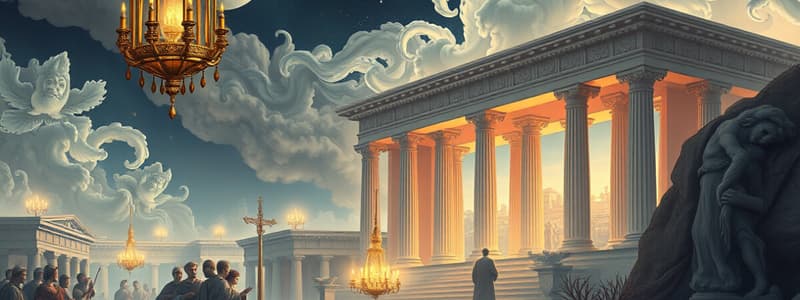Podcast
Questions and Answers
Who wrote about the Melian Dialogue?
Who wrote about the Melian Dialogue?
- Aristotle
- Thucydides (correct)
- Plato
- Socrates
How many years into the Peloponnesian War does the Melian Dialogue take place?
How many years into the Peloponnesian War does the Melian Dialogue take place?
fifteen
The Athenians demanded that the Melians __________ and __________ or face __________.
The Athenians demanded that the Melians __________ and __________ or face __________.
surrender their city; pay them tribute; the destruction of their city
What did the Athenians claim regarding questions of justice?
What did the Athenians claim regarding questions of justice?
What actions did the Athenians proceed to take towards the people of Melos once they refused to surrender?
What actions did the Athenians proceed to take towards the people of Melos once they refused to surrender?
What was the Athenian concern if they accepted the Melians' neutrality?
What was the Athenian concern if they accepted the Melians' neutrality?
What did the Melians believe regarding the assistance of the gods?
What did the Melians believe regarding the assistance of the gods?
What did Thucydides recount about the view of strength in moral arguments?
What did Thucydides recount about the view of strength in moral arguments?
Athenian: 'Of the gods we believe, and of men we know, that __________.'
Athenian: 'Of the gods we believe, and of men we know, that __________.'
Flashcards are hidden until you start studying
Study Notes
The Melian Dialogue Overview
- Dramatic debate detailed by Thucydides in "History of the Peloponnesian War"
- Set during the 27-year struggle (431-404 BC) between Athens and Sparta
Context of the Dialogue
- Occurs 15 years into the Peloponnesian War during the confrontation (416-415 BC) between Athenians and Melos
- Melos is a small island in the southern Aegean Sea, east of Sparta
Athenian Demands
- Athenians demanded Melians to surrender their city and pay tribute
- Refusal to meet these demands would lead to the destruction of Melos
Melians' Appeal
- Melians argue for their right to remain neutral, invoking Athenian decency towards peaceful entities
- Athenians respond asserting that justice is irrelevant between unequal powers and initiate a siege
Athenian Actions Post-Refusal
- Athenians aimed to starve the Melian inhabitants into submission
- Slaughtered military-aged men and enslaved women and children following refusal to surrender
Neutrality Argument
- Melians insist their neutrality negates the need for Athenian aggression
- Athenians argue accepting Melos' neutrality would project weakness, suggesting it would imply an inability to conquer
Dependence on Divine Support
- Melians express belief in receiving divine assistance, claiming righteousness against Athenian wrongs
- Athenians counter that strength prevails over moral arguments, highlighted by the phrase "The strong do as they can and the weak suffer what they must"
Athenian Philosophy on Power
- Athenian perspective: strength is inherent in nature; those with power rule as they can
- Assertion that the concept of power existed before their time and would endure beyond them, justifying their actions as the norm
Studying That Suits You
Use AI to generate personalized quizzes and flashcards to suit your learning preferences.




